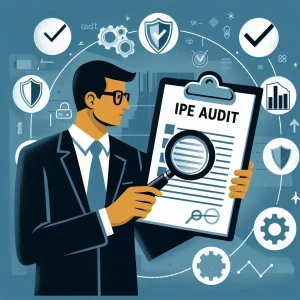In the realm of financial reporting, the International Financial Reporting Standards (IFRS) play a pivotal role in establishing a consistent and transparent framework for financial statements across various industries and countries. For professionals seeking to deepen their expertise, enrolling in an IFRS certificate program can be highly beneficial.
- Definition and Objectives of IFRS: IFRS refers to a set of accounting standards developed by the International Accounting Standards Board (IASB) that aim to provide a global framework for how public companies prepare and disclose their financial statements. The primary objectives of IFRS include enhancing the comparability and reliability of financial information, promoting transparency, and ensuring that financial statements reflect the true economic reality of an organization. This standardization is crucial for investors, regulators, and other stakeholders who rely on accurate financial data to make informed decisions.
- Importance of IFRS in Financial Reporting: The significance of IFRS in ensuring accurate financial reporting cannot be overstated. By adhering to these standards, organizations can improve the quality of their financial disclosures, which in turn fosters trust and confidence among stakeholders. IFRS helps mitigate the risk of financial misstatements and enhances the credibility of financial reports, thereby supporting effective decision-making processes. Furthermore, compliance with IFRS is often a regulatory requirement, making it essential for organizations to align their reporting practices with these standards to avoid potential legal repercussions.
- Concept of Internal Audit and Its Role in Compliance: Internal audit serves as an independent and objective assurance function designed to add value and improve an organization’s operations. It involves evaluating the effectiveness of risk management, control, and governance processes. In the context of compliance, internal audit plays a critical role in ensuring that an organization adheres to IFRS and other regulatory requirements. By conducting regular audits and assessments, internal auditors can identify areas of non-compliance, recommend improvements, and foster a culture of accountability and ethical behavior within the organization. This proactive approach not only helps in mitigating compliance risks but also enhances the overall integrity of financial reporting.
The integration of IFRS into internal audit practices is essential for building a culture of compliance. By understanding the objectives of IFRS and the role of internal audit, compliance officers and internal audit teams can work collaboratively to ensure that their organizations maintain high standards of financial reporting and governance.
The Importance of a Compliance-Oriented Culture
Fostering a compliance-oriented culture within organizations is essential for maintaining integrity and ensuring adherence to regulatory standards, particularly in the context of International Financial Reporting Standards (IFRS). This section will explore the significance of such a culture, the risks associated with non-compliance, and the benefits it brings to various stakeholders.
Risks Associated with Non-Compliance and Poor Financial Reporting
Non-compliance with financial regulations and standards can lead to severe consequences for organizations. The risks include:
- Legal Penalties: Organizations may face hefty fines and legal actions if they fail to comply with IFRS and other regulatory requirements. This can result in significant financial losses and damage to reputation [4].
- Financial Misstatements: Poor financial reporting can lead to inaccurate financial statements, which mislead stakeholders and can result in misguided business decisions. This not only affects internal management but also external parties such as investors and regulators [9].
- Operational Disruptions: Non-compliance can lead to operational inefficiencies and disruptions, as organizations may need to divert resources to address compliance issues rather than focusing on their core business activities.
Enhancing Organizational Integrity through a Compliance-Oriented Culture
A compliance-oriented culture is pivotal in enhancing organizational integrity. This culture is characterized by:
- Commitment to Ethical Standards: Organizations that prioritize compliance foster an environment where ethical behavior is expected and rewarded. This commitment helps in building trust among employees and stakeholders alike [2].
- Regular Training and Education: Continuous training on IFRS and compliance requirements ensures that employees at all levels are aware of their responsibilities and the importance of adhering to regulations. This proactive approach minimizes the risk of non-compliance [3].
- Open Communication: Encouraging open dialogue about compliance issues allows employees to voice concerns and seek guidance, which strengthens the overall compliance framework within the organization.
Benefits of Compliance for Stakeholders
A robust compliance-oriented culture not only protects the organization but also provides significant benefits to its stakeholders:
- Investor Confidence: Adherence to IFRS and a strong compliance culture enhance transparency and reliability in financial reporting, which boosts investor confidence. Investors are more likely to engage with organizations that demonstrate a commitment to compliance and ethical practices.
- Regulatory Relationships: Organizations that maintain high compliance standards often enjoy better relationships with regulators. This can lead to more favorable treatment during audits and inspections, as well as a reduced likelihood of regulatory scrutiny [5].
- Long-term Sustainability: By fostering a culture of compliance, organizations position themselves for long-term success. This approach not only mitigates risks but also enhances their reputation, making them more attractive to potential investors and partners [10].
Building a compliance-oriented culture through IFRS training is crucial for internal audit teams and compliance officers. It not only safeguards the organization against risks associated with non-compliance but also enhances integrity and provides substantial benefits to stakeholders. By prioritizing compliance, organizations can ensure sustainable growth and maintain a positive reputation in the marketplace.
IFRS Training: A Key Component of Compliance Culture
Building a culture of compliance within an organization is essential for ensuring adherence to regulatory standards and fostering ethical practices. The International Financial Reporting Standards (IFRS) play a pivotal role in this process, particularly for compliance officers and internal audit teams. Here, we outline the objectives of IFRS training, explore various training formats, and emphasize the importance of continuous education in this ever-evolving field.
Objectives of IFRS Training for Compliance Officers and Internal Audit Teams
The primary objectives of IFRS training include:
- Understanding Regulatory Requirements: Training equips compliance officers and internal auditors with a comprehensive understanding of IFRS standards, ensuring they can effectively interpret and apply these regulations within their organizations. This knowledge is crucial for maintaining compliance and avoiding potential penalties associated with non-adherence [1].
- Enhancing Risk Management: By understanding IFRS, internal audit teams can better identify and assess risks related to financial reporting. This proactive approach helps in developing strategies to mitigate risks, thereby strengthening the overall control environment.
- Promoting Accountability: IFRS training fosters a culture of accountability by clarifying the roles and responsibilities of compliance officers and auditors in upholding financial integrity. This clarity is essential for creating a transparent organizational culture.
Different Formats of IFRS Training Programs
IFRS training can be delivered in various formats to accommodate different learning preferences and organizational needs:
- Online Courses: These programs offer flexibility, allowing participants to learn at their own pace. Online courses often include interactive modules, quizzes, and resources that can be accessed anytime, making them ideal for busy professionals [1].
- In-Person Training: Traditional classroom settings provide opportunities for direct interaction with instructors and peers. This format is beneficial for engaging discussions and networking, which can enhance the learning experience.
- Workshops: Focused workshops can be tailored to specific topics within IFRS, allowing participants to dive deeper into particular areas of interest. These sessions often include case studies and practical exercises, making the learning process more applicable to real-world scenarios.
Importance of Continuous Education and Staying Updated with IFRS Changes
The landscape of financial reporting is constantly evolving, with updates and changes to IFRS standards occurring regularly. Continuous education is vital for several reasons:
- Adapting to Changes: Regular training ensures that compliance officers and internal auditors stay informed about the latest IFRS developments. This knowledge is crucial for adapting internal processes and controls to meet new regulatory requirements [1].
- Maintaining Competence: Ongoing education helps professionals maintain their expertise and competence in the field. This is particularly important in a regulatory environment where compliance failures can have significant repercussions for organizations.
- Fostering a Culture of Learning: By prioritizing continuous education, organizations signal the importance of compliance and ethical practices. This commitment to learning can inspire a culture of compliance that permeates throughout the organization.
IFRS training is a fundamental component of fostering a compliance-oriented culture within organizations. By understanding the objectives of training, exploring various formats, and emphasizing the need for continuous education, compliance officers and internal audit teams can effectively promote adherence to regulatory standards and enhance the overall integrity of financial reporting.
Implementing an IFRS Certificate Program
In today’s complex regulatory environment, fostering a culture of compliance is essential for organizations, particularly within internal audit functions. An IFRS (International Financial Reporting Standards) certificate program can serve as a cornerstone for building this culture. Below is a roadmap for organizations looking to implement an effective IFRS certificate program.
Key Components of an Effective IFRS Certificate Program
- Curriculum Development: The program should cover essential IFRS topics, including the latest standards, financial reporting requirements, and the implications of IFRS on internal controls and audit processes. This ensures that participants gain a comprehensive understanding of the standards and their application in real-world scenarios.
- Practical Application: Incorporate case studies and practical exercises that allow participants to apply IFRS concepts to actual business situations. This hands-on approach enhances learning and retention, making it easier for compliance officers and internal audit teams to implement IFRS in their daily operations.
- Assessment and Certification: Establish a robust assessment framework to evaluate participants’ understanding and application of IFRS. Successful completion of assessments should lead to certification, which not only validates the participants’ knowledge but also enhances their professional credibility.
Aligning the Program with Organizational Goals and Compliance Requirements
- Integration with Business Objectives: Ensure that the IFRS certificate program aligns with the organization’s overall strategic goals. This can be achieved by involving key stakeholders in the program design process, ensuring that the training addresses specific compliance challenges and operational needs.
- Regulatory Compliance: The program should be designed to meet relevant regulatory requirements and industry standards. This includes staying updated on changes in IFRS and ensuring that the training content reflects these updates, thereby preparing internal audit teams to navigate compliance effectively.
- Continuous Improvement: Establish a feedback mechanism to assess the effectiveness of the program regularly. This allows for adjustments based on participant feedback and changes in regulatory requirements, ensuring that the program remains relevant and effective over time.
Tips for Selecting Trainers and Resources for the Program
- Expertise and Experience: Choose trainers who have extensive experience in IFRS and a strong background in internal audit. Their practical insights and real-world examples will enrich the learning experience for participants.
- Diverse Learning Resources: Utilize a mix of learning resources, including online courses, workshops, and seminars. This variety caters to different learning styles and allows participants to engage with the material in multiple ways.
- Networking Opportunities: Consider incorporating networking opportunities within the program, such as guest speakers from the industry or panel discussions. This not only enhances learning but also fosters connections among compliance officers and internal audit professionals, promoting a culture of collaboration and shared knowledge.
By implementing a well-structured IFRS certificate program, organizations can significantly enhance their internal audit capabilities and foster a culture of compliance. This proactive approach not only prepares teams to meet regulatory challenges but also positions the organization for long-term success in a rapidly evolving financial landscape.
Assessing the Impact of IFRS Training on Internal Audit
In the evolving landscape of financial reporting and compliance, the International Financial Reporting Standards (IFRS) play a pivotal role in shaping the internal audit function. As organizations strive to foster a culture of compliance, the implementation of IFRS training becomes essential. This section evaluates how IFRS training contributes to the effectiveness of internal audit functions, focusing on assessment methods, success stories, and metrics for measuring impact.
Methods for Assessing the Impact of IFRS Training on Audit Quality
- Pre- and Post-Training Assessments: Conducting assessments before and after IFRS training can provide insights into the knowledge gained by internal audit teams. This can include quizzes, practical case studies, and scenario-based evaluations to measure understanding and application of IFRS principles.
- Quality Reviews of Audit Work: Implementing a system of quality reviews post-training can help assess the impact of IFRS training on audit quality. This involves evaluating audit reports for adherence to IFRS standards and the effectiveness of audit procedures.
- Feedback Mechanisms: Establishing feedback loops where internal auditors can share their experiences and challenges in applying IFRS can provide qualitative data on the training’s effectiveness. Regular surveys and focus groups can be instrumental in gathering this information.
- Benchmarking Against Best Practices: Comparing the internal audit function’s performance against industry benchmarks can help assess the impact of IFRS training. Organizations can evaluate their audit quality, compliance rates, and overall effectiveness relative to peers who have undergone similar training.
Metrics for Measuring Compliance and Audit Effectiveness Post-Training
Compliance Rates: Tracking compliance rates with IFRS standards before and after training can provide a clear indication of the training’s effectiveness. This can include monitoring the number of compliance breaches and the severity of issues identified during audits.
Audit Findings and Recommendations: Analyzing the number and nature of audit findings can help measure the impact of IFRS training. A reduction in significant findings related to financial reporting can indicate improved audit quality.
Time to Resolve Issues: Measuring the time taken to resolve compliance issues identified during audits can serve as a metric for audit effectiveness. A decrease in resolution time post-training may suggest enhanced skills and knowledge among auditors.
Stakeholder Satisfaction: Gathering feedback from key stakeholders, including management and external auditors, can provide insights into the perceived effectiveness of the internal audit function post-IFRS training. High satisfaction levels can indicate successful training outcomes.
Assessing the impact of IFRS training on internal audit functions is crucial for fostering a compliance-oriented culture. By employing various assessment methods, sharing success stories, and establishing clear metrics, organizations can enhance their internal audit capabilities and ensure adherence to IFRS standards. This not only strengthens compliance but also contributes to the overall integrity and reliability of financial reporting.
Challenges in Building a Culture of Compliance
Establishing a compliance-oriented culture within an organization is essential for effective internal audit practices, particularly in the context of International Financial Reporting Standards (IFRS). However, organizations often encounter several challenges that can hinder this process. Below are some common obstacles and strategies to address them:
Common Challenges
- Resistance to Change: Employees may be hesitant to adopt new compliance measures or IFRS standards due to a fear of the unknown or a preference for established practices. This resistance can stem from a lack of understanding of the benefits that compliance brings to the organization.
- Resource Constraints: Many organizations face limitations in terms of time, budget, and personnel dedicated to compliance training and implementation. This can lead to inadequate training programs and insufficient support for internal audit teams.
- Lack of Awareness: There may be a general lack of awareness regarding the importance of IFRS and compliance among employees. Without a clear understanding of how these standards impact their roles, employees may not prioritize compliance in their daily activities.
Strategies to Overcome Challenges
- Leadership Buy-In: Gaining support from top management is crucial. Leaders should actively promote the importance of compliance and IFRS training, demonstrating their commitment through actions and resources. This can help to create a culture where compliance is valued and prioritized.
- Effective Communication Plans: Developing a robust communication strategy is essential for educating employees about the significance of compliance and IFRS. Regular updates, training sessions, and open forums for discussion can help to clarify expectations and reduce resistance to change.
- Tailored Training Programs: Implementing targeted training programs that address specific compliance challenges can enhance understanding and engagement. These programs should be designed to meet the needs of different departments and roles within the organization.
Sustaining a Compliance Culture
- Ongoing Support and Resources: To maintain a culture of compliance, organizations must provide continuous support and resources. This includes regular training updates, access to compliance tools, and a dedicated team to address compliance-related queries.
- Monitoring and Feedback Mechanisms: Establishing systems for monitoring compliance and gathering feedback can help organizations identify areas for improvement. Regular audits and assessments can ensure that compliance measures are effective and aligned with IFRS standards.
By addressing these challenges and implementing effective strategies, organizations can foster a culture of compliance that not only adheres to IFRS but also enhances overall organizational integrity and performance.
Conclusion: The Future of IFRS in Internal Audit
As organizations navigate the complexities of financial reporting, the significance of International Financial Reporting Standards (IFRS) training in internal audit cannot be overstated. The integration of IFRS into internal audit practices is essential for fostering a culture of compliance within organizations. Here are the key takeaways regarding the future implications of IFRS in internal auditing:
- Importance of IFRS Training: Training in IFRS equips internal audit teams and compliance officers with the necessary knowledge to understand and implement these standards effectively. This understanding is crucial for identifying risks and ensuring that financial reporting aligns with regulatory requirements. A well-informed team can better assess compliance and contribute to the overall integrity of financial statements, thereby reinforcing a culture of compliance within the organization.
- Ongoing Commitment to Training: The landscape of financial reporting is continually evolving, with new regulations and standards emerging regularly. It is imperative for internal audit teams to commit to ongoing training and education in IFRS. This commitment not only enhances the team’s capabilities but also ensures that the organization remains agile and responsive to changes in the regulatory environment. By staying updated, internal auditors can proactively address compliance challenges and mitigate risks associated with non-compliance.
- Call to Action for Compliance Officers and Internal Audit Teams: Compliance officers and internal audit teams are encouraged to prioritize IFRS education as a fundamental component of their professional development. By investing in IFRS training programs, organizations can cultivate a workforce that is not only knowledgeable but also adept at navigating the complexities of financial reporting. This proactive approach will ultimately lead to stronger compliance frameworks and a more resilient organizational culture.
In conclusion, the future of IFRS in internal audit is bright, provided that organizations recognize the critical role of training and education. By fostering a compliance-oriented culture through robust IFRS training, organizations can enhance their internal audit functions and ensure adherence to the highest standards of financial reporting.
Find out more about Shaun Stoltz https://www.shaunstoltz.com/about/
This post was written by an AI and reviewed/edited by a human.



